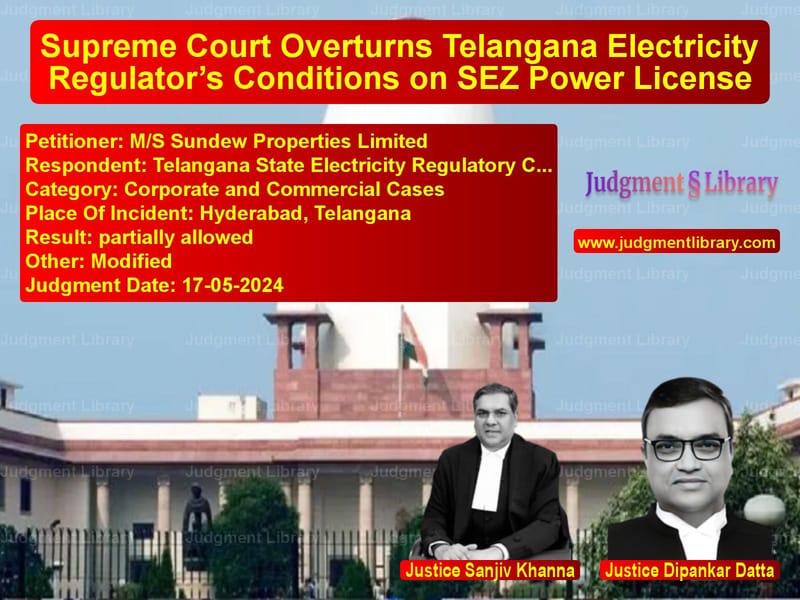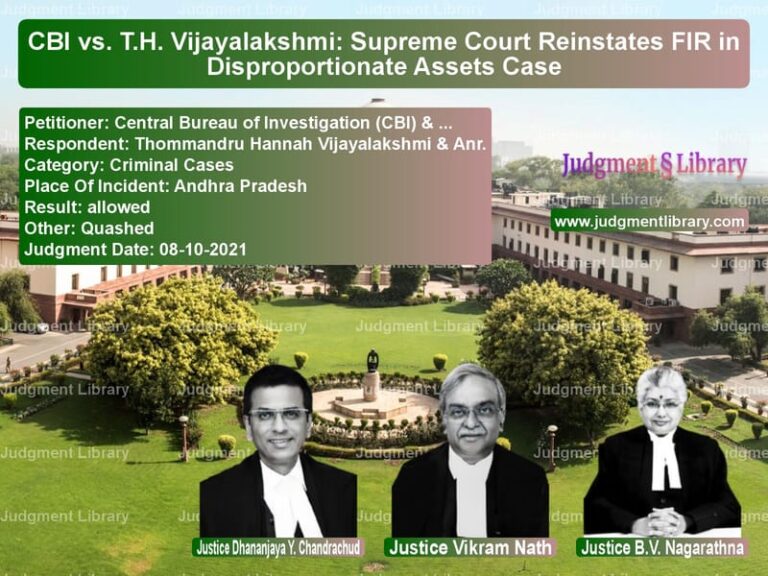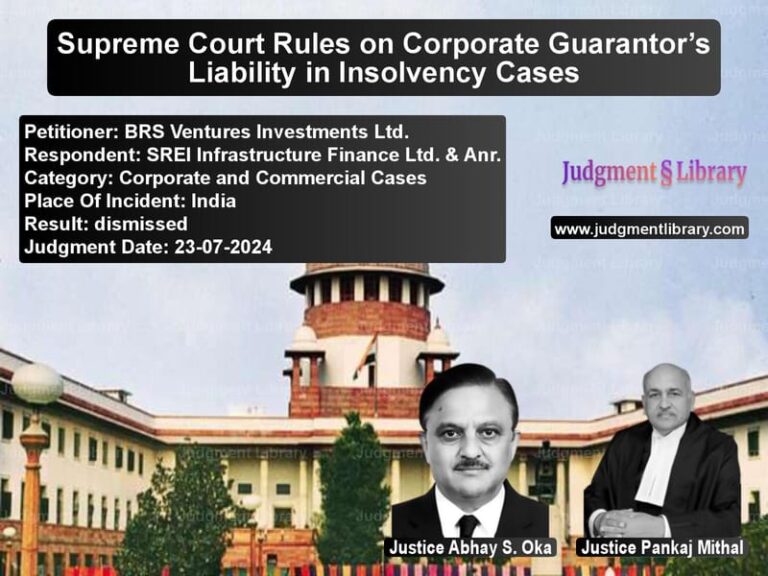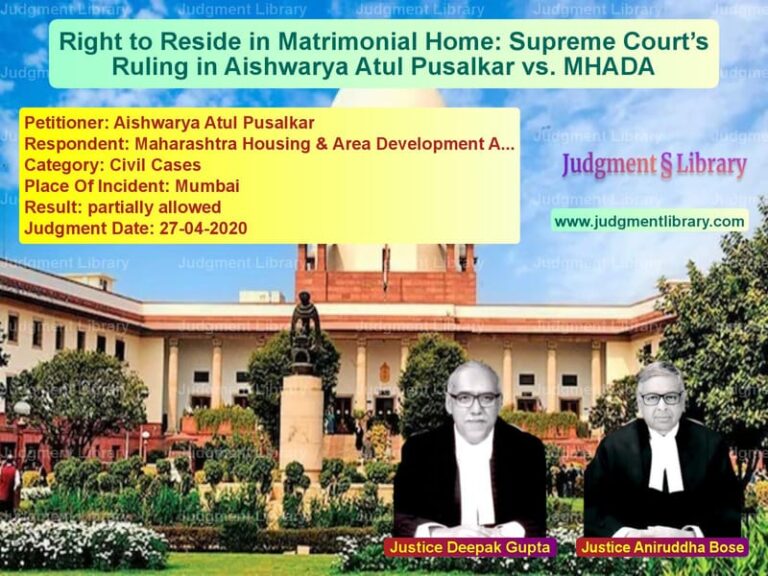Supreme Court Overturns Telangana Electricity Regulator’s Conditions on SEZ Power License
The case of M/S Sundew Properties Limited vs. Telangana State Electricity Regulatory Commission & Anr. revolves around the regulatory framework governing electricity distribution in Special Economic Zones (SEZs). The Supreme Court, in its judgment dated May 17, 2024, ruled in favor of the appellant by setting aside the Telangana State Electricity Regulatory Commission’s (TSERC) condition that required additional capital infusion as a prerequisite for granting a deemed distribution license. The Court emphasized that such conditions were contrary to the statutory framework governing SEZ developers.
Background of the Case
The appellant, M/S Sundew Properties Limited, was designated as a SEZ developer for the IT/ITES sector in Madhapur, Ranga Reddy District, Hyderabad, under the Special Economic Zones Act, 2005 (SEZ Act). Under a notification issued by the Ministry of Commerce & Industry (MoCI) on March 3, 2010, SEZ developers were granted the status of deemed distribution licensees under the Electricity Act, 2003. However, when the appellant applied for recognition as a deemed licensee, the TSERC imposed additional conditions, particularly requiring an equity infusion of ₹26.90 crore before granting the status.
Legal Proceedings
The appellant challenged the TSERC’s decision before the Appellate Tribunal for Electricity (APTEL) under Section 111 of the Electricity Act. The APTEL upheld TSERC’s ruling, maintaining that the appellant had to comply with capital adequacy requirements under Rule 3(2) of the Distribution of Electricity Licence Rules, 2005. Dissatisfied, the appellant moved the Supreme Court under Section 125 of the Electricity Act.
Arguments by the Petitioner (Sundew Properties Limited)
Senior Counsel Rakesh Singh, representing the appellant, argued:
- The 2010 Notification under the SEZ Act granted SEZ developers automatic status as deemed distribution licensees without additional requirements.
- The TSERC exceeded its jurisdiction by imposing conditions that are not provided under the Electricity Act.
- The TSERC’s reliance on Rule 3(2) of the 2005 Rules and Regulation 12 of the Andhra Pradesh Electricity Regulatory Commission (Distribution Licence) Regulations, 2013 was misplaced.
- The SEZ developer’s financial health should not be a criterion for granting the license, as per the statutory provisions.
Arguments by the Respondents (TSERC & Southern Power Distribution Company of Telangana Ltd.)
Senior Counsel V. Vaidyanathan, representing the respondents, countered:
- Although SEZ developers are deemed licensees, they must comply with general conditions applicable to all distribution licensees.
- The TSERC was authorized to impose financial viability conditions to ensure that the appellant had adequate capital for electricity distribution.
- The appellant had suffered financial losses, making the additional capital requirement a reasonable safeguard.
Supreme Court’s Observations
1. SEZ Developers Are Automatically Deemed Licensees
The Court clarified:
“By virtue of the 2010 Notification, the appellant is entitled to the privilege of being acknowledged as a deemed distribution licensee under the Electricity Act without requiring compliance with additional conditions.”
2. Regulatory Restrictions Cannot Supersede Statutory Provisions
The Supreme Court ruled that the TSERC had no authority to impose capital adequacy requirements on SEZ developers:
“The status of a deemed distribution licensee is conferred automatically under the Electricity Act. The imposition of additional conditions is beyond the regulatory powers of the TSERC.”
3. Previous Rulings Were Misinterpreted
The respondents relied on the Supreme Court’s ruling in Sesa Sterlite Ltd. vs. Orissa Electricity Regulatory Commission, arguing that deemed licensees must comply with general licensing conditions. The Court distinguished the cases, stating:
“The Sesa Sterlite ruling does not imply that SEZ developers must fulfill capital adequacy requirements to gain deemed licensee status.”
4. Additional Capital Requirement Was Unjustified
The Court found no justification for the ₹26.90 crore capital requirement imposed by TSERC:
“The SEZ framework was designed to encourage private investment, and imposing such financial barriers defeats the purpose of the policy.”
Key Findings and Judgment
The Supreme Court concluded:
- SEZ developers are automatically deemed distribution licensees under the Electricity Act.
- TSERC’s additional capital requirement is contrary to statutory provisions and cannot be enforced.
- The appellant’s recognition as a deemed licensee remains valid without the need for further conditions.
The Court ruled:
“The TSERC and APTEL rulings are set aside to the extent that they impose additional financial conditions. The appellant is recognized as a deemed distribution licensee without the requirement to infuse additional capital.”
Implications of the Judgment
This ruling has far-reaching consequences:
- Encouragement for SEZ Investment: SEZ developers can now operate distribution networks without regulatory financial constraints.
- Limitation on Regulatory Overreach: Electricity regulators cannot impose conditions beyond those prescribed in the Electricity Act.
- Clarity on Deemed Licensee Status: SEZ developers do not need to meet separate financial eligibility criteria to obtain deemed licensee status.
- Strengthening of SEZ Policies: The ruling reinforces India’s SEZ policy by ensuring regulatory ease.
Conclusion
The Supreme Court’s decision in M/S Sundew Properties Limited vs. Telangana State Electricity Regulatory Commission & Anr. ensures that SEZ developers retain their statutory rights as deemed distribution licensees. By eliminating arbitrary financial conditions imposed by regulatory bodies, the judgment strengthens investor confidence in the SEZ framework and reinforces the principle that regulatory powers must be exercised within statutory limits.
Petitioner Name: M/S Sundew Properties Limited.Respondent Name: Telangana State Electricity Regulatory Commission & Anr..Judgment By: Justice Sanjiv Khanna, Justice Dipankar Datta.Place Of Incident: Hyderabad, Telangana.Judgment Date: 17-05-2024.
Don’t miss out on the full details! Download the complete judgment in PDF format below and gain valuable insights instantly!
Download Judgment: ms-sundew-propertie-vs-telangana-state-elec-supreme-court-of-india-judgment-dated-17-05-2024.pdf
Directly Download Judgment: Directly download this Judgment
See all petitions in Company Law
See all petitions in Corporate Compliance
See all petitions in unfair trade practices
See all petitions in Judgment by Sanjiv Khanna
See all petitions in Judgment by Dipankar Datta
See all petitions in partially allowed
See all petitions in Modified
See all petitions in supreme court of India judgments May 2024
See all petitions in 2024 judgments
See all posts in Corporate and Commercial Cases Category
See all allowed petitions in Corporate and Commercial Cases Category
See all Dismissed petitions in Corporate and Commercial Cases Category
See all partially allowed petitions in Corporate and Commercial Cases Category







